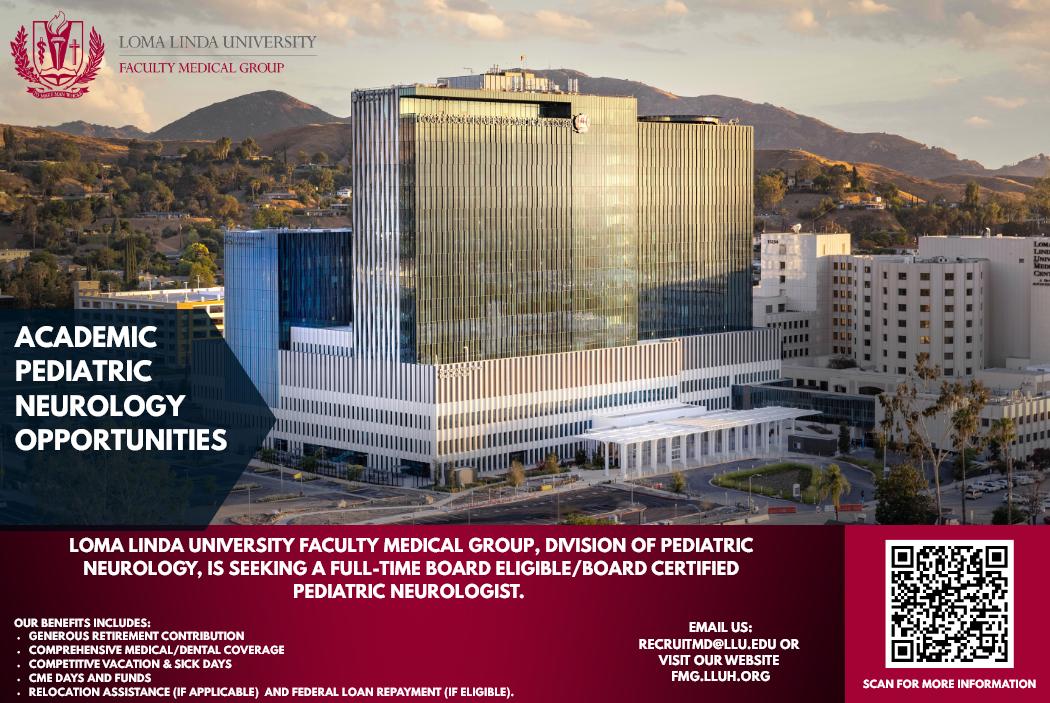





Physician Owned and Managed



Full-time and part-time positions available.
Led by physicians who bring firsthand insight into the needs of both providers and patients
Geographic Independence
Practice anywhere in the United States without the commute
Administrative Freedom
We handle licensing, credentialing, and malpractice, you handle the medicine
Professional Network
24/7 neurologist collaboration without the hospital politics
Financial Security
Competitive base salary, performance-based bonuses, full benefits, 401K matching, CME stipends and unlimited extra shifts
tstelemed.com/physicians




Perhaps this has happened to you: You go onto the AAN Neurology Career Center job board and start perusing the postings. Before long, you’ve identified a position that sounds pretty good. You read the information with growing interest, your cursor hovering over “Apply Now”…and hovering…and hovering. And then you move on to another position, or perhaps you leave the site.
What just happened? The diagnosis is simple: You’re suffering from Application Hesitation. Despite your best intentions, you’re stopping yourself from completing a few short steps that could lead to an interesting new job.
So that explains what’s happening, but not why. Here are some of the reasons people hesitate to apply for jobs, even when they’re very interested. If you see any that describe your situation, the prescription provided will help you overcome the barrier.
You may have had the experience of answering an online ad and suddenly finding your inbox filling up with unwanted solicitations. That’s a reasonable fear with
other job boards, but the Academy sees you as a valued member, not a product to sell to advertisers, so your information is kept confidential.
Antidote: Click Apply. You’re not likely to receive unwanted email from employers you contact on the Career Center’s job board, but if you do, just opt out.
2. Fearing that applying could initiate a process you don’t have time for.
It’s one thing to complete a brief application process, but another to fit conversations and meetings into your schedule. You might be concerned that applying will obligate you to steps you can’t commit to right now.
Antidote: If your application results in contact from a recruiter or employer, simply explain your schedule conflicts in a brief response. In most cases, they’ll be able to work with you to fit your calendar.
3. Unprepared for the interview process.
Scheduling interviews may not be your concern so much as actually participating in them. It may have been awhile since you’ve interviewed for employment as opposed to matching for a training program. Indeed, perhaps you’ve never done that as a neurologist, at least not yet.
Antidote: You’re going to have to cross this bridge sometime, so why not now? Go ahead and apply, then get
busy. You’ll find helpful articles in the Neurology Career Center to help you prep for interviews.
4. Not feeling certain the job will be a good fit.
This is one of those closed-loop problems.
Without more information, you don’t know if this job would be right for you—but because you don’t know, you hesitate to apply, which is how you would get more information.
Antidote: Apply. Determining fit is something that happens during conversations with the recruiter or employer, which is what happens after they receive your application.
5. Not feeling clear on your overall career direction.
Of course, you know you’ll be working as a neurologist, but you may be feeling less clarity about practicing in a subspecialty, or what balance you want between research and teaching, or any number of other issues relating to your career path. This can lead to a kind of windowshopping process where you review postings in the hopes of finding that clarity, without ever moving forward.
Antidote: Go ahead and take a spin through the postings without clicking Apply. Then collect your favorites and apply to the two that appeal to you most. Just starting the conversations with recruiters may be enough to help sort through your priorities, but if it isn’t, you can repeat the exercise. Eventually you will have enough information to make good comparisons between different options.
Not feeling certain you’re qualified for the job.
Some job postings are very detailed while others leave a lot to the imagination. In both cases, it’s easy for a candidate to feel intimidated and uncertain about being qualified.
Antidote: Deciding whether you’re qualified is actually not your job—it’s the job of the recruiter or employer. When you feel interested but uncertain, go ahead and apply. Even if you’re not qualified, you may receive information about other positions for which your skills are a better match.
This is a cousin to the issue of feeling unqualified or uncertain about what the position requires. You hate to start something just to have it fizzle out when you could have saved everyone the trouble to begin with.
Antidote: Again, let the recruiters make that determination; it’s their job. If you asked them, they would almost certainly tell you they’d rather spend the time with you than not, even if the situation doesn’t end with a match.
8. Finding something that’s “off” in the posting.
Perhaps you’re not certain about the location, or you’d prefer a different mix of duties, or you’re concerned the salary won’t work.
Antidote: This is a case where you can assume too much. As in, assuming you understand the position from such a short description, or assuming nothing about the position can be changed. Applying will give you entrée to the conversations that will give you the facts you need.
How do you know this hospital or practice is wellmanaged, or that you’ll be treated well by them? How can you be sure they’re growing, or will help you manage your career well?
Antidote: In truth, you might never feel complete certainty about a potential employer before you sign on. Instead of setting certainty as a goal, vow to do your due diligence before accepting an offer by talking with others or researching websites for reviews by other employees. In the meantime, go ahead and apply, or the question will be moot.
You may be checking the postings a few months or even years early, in terms of when your training will be finished. Or, you may be right on time, but still feeling hesitant about starting this next chapter in your career.
Antidote: Ask any recruiter and they’re likely to tell you they’d rather hear from you early than not at all. Go ahead and apply so you can start the conversation about this role or employer. If you’re ahead of schedule, you can say so and let the recruiter decide whether to keep moving forward. You may be surprised to learn that some opportunities can be locked in a long time in advance, and sometimes include a signing bonus or other financial incentive. But no worries—if you’re not ready to make that commitment, you only need to say so.
Yes! You really should. Your reasons for hesitating are valid, but also permeable. That is, although each of these 10 reasons makes sense, none of them preclude you from contacting the employer or recruiter. By clicking to apply, you begin a conversation and a relationship that could lead to the best job of your career. And even if it doesn’t, you’ll be more connected and informed than if you had sat on the sidelines. So, go ahead: Stop hovering your cursor and Apply Now.


Emerson Hospital located in historic Concord Massachusetts has an opportunity for a Board Certified/Board Eligible Neurologist to join our team.
This opportunity is an employed position with Emerson Practice Associates
• Competitive salary and benefit package
• Sleep Center, Concussion Center, Parkinson’s Center, Telestroke
• Excellent support from a dedicated team of neurologist, administration and staff
• Full service diagnostics are available at hospital, which was certified by the state of Massachusetts as a Primary Stroke Center in 2004
• Practice in one of the most desirable practice locations in Massachusetts For
Diane Forte Willis, Director of Physician Recruitment and Relations dfortewillis@emersonhosp.org
Phone: 978-287-3002 • Fax: 978-287-3600
Emerson Health is a regional health system providing advanced healthcare to more than 300,000 people across 25 towns in Massachusetts. We make high-quality healthcare more accessible to those who live and work in our community at Emerson Hospital in Concord, health centers in Bedford, Groton, Sudbury, Westford, and Concord, and Urgent Care settings in Hudson, Littleton, and Maynard.
Emerson has strategic alliances with several academic centers in Boston, including Mass General Brigham and Massachusetts Eye and Ear Infirmary. Concord, MA and the surrounding communities are among the best places to live in Massachusetts, with several top-ranked school systems in the state and located just 20 miles west of Boston.

Trinity Health Medical Group and Trinity Health IHA Medical Group are actively recruiting Neurologists to join our Neurosciences teams across Michigan.
Opportunities available in these subspecialties:
• Cognitive Neurologist – Grand Rapids
• Headache Neurologist – Grand Rapids
• Multiple Sclerosis/ Neuroimmunologist – Grand Rapids
• Neuro-Ophthalmologist – Grand Rapids
• Neuropsychologist – Grand Rapids
• Pain Physiatrist – Muskegon
• Ambulatory Neurologist – Ann Arbor & Chelsea
• Cognitive Neurologist – Ann Arbor
• Epileptologist – Ann Arbor
• Headache Neurologist – Ann Arbor
• Movement Disorder – Ann Arbor
• General Neurologist - Oakland
Why work and live in Michigan?
• Whether you’re drawn to breathtaking scenery, rich culture, or outdoor fun for the whole family, Michigan has something for everyone. It’s a wonderful place to call home and build a career.

• Michigan borders four of the five Great Lakes, boasting hundreds of miles of pristine shoreline, breathtaking sunsets, and endless opportunities for water activities like boating, fishing, and kayaking.
• Michigan offers a lower cost of living than the national average, especially when it comes to housing, making it an affordable place to settle down.
If interested in learning more about Trinity Health opportunities, please contact: West Michigan – Mandy Vernon at Vernona@trinity-health.org Southeast Michigan – Christy Meda Prakash at Christy_MedaPrakash@ihacares.com
THMI W12899-2506-BC

Well, this is awkward. You’ve decided to look for a new job, but you don’t want your current employer to know you’re searching. What can you do?
First of all, let go of any guilt. No matter how well you’ve been treated by your boss (or how poorly, for that matter), sometimes you just need to move on. You might be burned out in your job, or you could be hoping to practice more in your specialty, or perhaps you’re seeking a greater challenge than your employer can offer you. Whatever your reason(s) for leaving, it’s a normal part of being an employee. As for your patients, students, or colleagues— of course you’re torn about leaving them. But if you’ve made your decision, then the success of your transition might depend on putting your feelings aside.
Consideration for others is one reason physicians choose to keep a job search confidential, at least in the early stages. It can be very disruptive to a department or practice to know someone is leaving but not know when. Likewise, although patients appreciate ample notice for switching doctors, a months-long goodbye can prove unsettling.
Speaking of patients, there’s also a business reason for not broadcasting your departure too far in advance. People seeking a new physician might be less likely to choose you if they know you will be leaving soon. While it might seem only fair for prospective patients to have that information, what if you don’t follow through with your plan or can’t find a suitable new job? If you end up staying, you don’t want to be needlessly scrambling to refill your patient schedule.
One more reason to keep a low profile while you’re job searching: If your boss knew you had been looking but couldn’t find what you wanted, you could be eating a major piece of humble pie. You could also lose leverage when negotiating changes to your current job. It’s hard for employers to invest resources in employees they consider a flight risk.
If your plan is to stay below the radar with your search, you’re living in the right time. Today’s technology makes it more possible than ever to have private conversations and conduct research without being obvious about it. To take advantage of these opportunities, you’ll need to make some initial decisions about the geographic location of your new work and about the work itself. Basically, what kind of job do you want, and where? Being able to
answer these questions lets you focus your outreach and conversations, which shortens your search and reduces the amount of “side chatter” that could lead back to your current employer.
Once you know what and where your next work will be, it’s time to dig out your employment contract, complete with its non-compete clause. If you have no non-compete, then no worries. But assuming that you do, you’ll need to know the parameters: How long are you restricted after leaving your job and what territory is covered by the restriction? If you discover that your contract conflicts with your goals, don’t panic. Depending on the situation, there may be a way to negotiate a favorable compromise with your employer. This would be a good time to talk with an attorney who specializes in medical practices to learn your options.
Finally, you’ll need an updated CV before you’re ready to launch your job search. If it’s been a while since you last looked for a position, it’s smart to go the extra mile in preparing your CV. Rather than simply adding your current role to the top of the employment section, consider having your document remade professionally.
Job goal, geographic goal, non-compete strategy, refreshed CV—check, check, check, check. It’s all systems go to launch your job search, but quietly. Here are three excellent resources to help you conduct an efficient but confidential search process.
1. The AAN’s Neurology Career Center. This is your go-to place for hundreds of current job postings in neurology, as well as helpful articles and tools to guide your job search process. Start by completing your confidential candidate profile and upload your CV to complete your file. Now when you see an interesting posting, you’ll be able to respond and apply in minutes.
2. Online job fairs. The Neurology Career Center hosts a virtual job fair online every three months, making it easy for you to connect directly with a dozen or more employers in a single session. If you haven’t tried this before, you’ll love the efficiency of using just a few hours to accomplish what would otherwise take days or weeks in terms of one-on-one meetings with currently-hiring employers. Best yet, these discussions are completely private, unlike in-person events where others can see you visiting employer booths.
3. Recruiters. When you feel pressed for time or need help making headway, recruiters can bring a welcome burst of activity to your job search. Once you tell a
recruiter your work and geographic goals, he or she can search databases for opportunities that fit, then make the connection between you and the employer. You may also benefit from the recruiter’s counsel in terms of your goals and expectations.
Two things you should know, though—first, it’s common for recruiters to push the envelope a bit by bringing you opportunities on the edge of what you requested. You can always say no, so this isn’t really a problem; indeed, many doctors have found themselves delighted by taking jobs they wouldn’t have thought of pursuing. The second thing to know is that a recruiter’s candidate database can have a surprising half-life. That is, unless you explicitly request otherwise, recruiters have been known to shop their candidate CVs to employers even after a new position has been secured. Forewarned is forearmed: Ask the recruiter about their practices and make your wishes clear.
For the most part, it’s very doable to conduct a job search under the radar. But there are some situations that take a bit of finesse or strategy. For example, if the position you want is internal—with the same employer, but in a different department—you’ll need to be quite strategic to keep things under wraps while you explore your options. In this case, it makes sense to shorten the “secret” stage of your job search as much as possible, to lessen the chance your boss will hear about it from someone other than you. Likewise, using your normal network and references can also make it harder to keep your search confidential. And yet, you don’t want to forgo the important boost these colleagues and mentors could provide. One

strategy to consider is to bring just a few people into your confidence, at least at the beginning. Once you’re ready to go public with your new job, first make individual calls or send personal emails to others in your network so they are nearly “first to know.” This will help preserve these important relationships without compromising your initial need for privacy.
Speaking of the initial need for privacy—don’t forget to state somewhere in your cover letters when you respond to postings, “Thank you for keeping this confidential, as I am in the early stages of my exploration.” This can be done effectively as a P.S. after your signature line, or as part of the final paragraph of your letter.
One other tricky situation you’ll have to navigate is the interview question, “Why are you leaving your current job?” If you can’t say something simple, such as “We’re relocating to be near my spouse’s family,” you’ll need to strategize an answer in advance. For example, it probably wouldn’t land well to say, “I’m burned out” or even, “My work isn’t challenging me.” Honest as those answers may be, they throw up red flags for a new boss. A better strategy is to build your answer around excitement for the new job, not dissatisfaction in the old one. Perhaps, “I’ve been wanting to practice more in my specialty area and that’s something I feel like I can do this position. I’m really excited about…”
Now that you know the secret for “under the radar” job searches, that’s one less barrier to hold you back. If you decide you’re ready for new work, there’s no time like the present to start.
CommonSpirit Health® is a nonprofit faith-based academic health system dedicated to advancing health for all people. With approximately 175,000 team members and 25,000 physicians and advanced practice providers, CommonSpirit operates 137 hospitals and more than 2,300 care centers serving sites across 24 states.
We are seeking Neurology Physicians and Advanced Practice Providers (NP or PA) to join our affiliated groups in the following states:
Colorado

Apply online at providers.commonspirit.careers

Mercy seeks board-certified or eligible neurosurgeons to join our care teams in Arkansas, Missouri and Oklahoma.

Neuromuscular Opportunity with Neurology Specialists in
Be part of a trusted, physician -led private neurology group that values collaboration, autonomy, and clinical excellence in coastal Virginia. You will join a team that includes specialists in neuromuscular medicine, epilepsy, movement disorders, multiple sclerosis, and more. We are seeking a full-time board certified or board eligible Neurologist with fellowship training in Neuromuscular Medicine. The fulltime, outpatient role offers minimal call, EMG-focused practice, full benefits packing including malpractice, paid time off, CME allowance and much more, along with a clear partnership eligibility track in year three.

Live where others vacation. Norfolk is a vibrant, coastal city in southeastern Virginia, offering the best of both worlds urban culture and waterfront tranquility. Nestled in the heart of Hampton Roads, it’s part of a diverse metro area that includes Virginia Beach, Chesapeake, and Newport News.
Waterfront Living: Enjoy easy access to beaches, rivers, and the Chesapeake Bay perfect for kayaking, sailing, or relaxing by the water after clinic hours.
Affordable Coastal Living: Compared to many coastal cities, Norfolk offers a low cost of living, diverse housing options, and no state income tax on Social Security benefits.
Cultural Hub: Home to the Virginia Symphony Orchestra, Chrysler Museum of Art, the Virginia Opera, and vibrant local dining and music scenes.
Education & Academia: Proximity to Eastern Virginia Medical School (EVMS), Old Dominion University, and other institutions supports professional development and potential teaching opportunities.
Family-Friendly: Strong public and private school options, plus family-friendly amenities like the Virginia Zoo, botanical gardens, and year-round festivals.
Easy Getaways: A short drive to the Outer Banks, Washington D.C., and Shenandoah National Park makes weekend trips a breeze.
Send your resume to: administrator@nslva.com for more information. 6161 Kempsville Circle | Halifax Building, Suite 315 | Norfolk, VA 23502 www.neuroconsultants.com

We are recruiting a BC/BE Cognitive/Behavioral Neurologist to join our multidisciplinary team at the Center for Cognitive and Memory Disorders. In this role, you will participate in clinical care, education, and research in cognitive and memory disorders. Op portunities for investigator initiated research and involvement in clinical trials are available. You will work alongside behavioral neurolo gists, neuropsychiatrists, research scientists, neuropsychologists, psychometrists, social workers, genetic counselors, and research staff. Clinical cognitive care is provided in the Memory Disorders Clinic and subspecialty clinics. Contributions to our comprehensi ve educational programs for trainees include training fellows in both Behavioral Neurology & Neuropsychiatry and Geriatric Neuro logy.
Qualifications:
• Board Certified/Board Eligible in Neurology with a focus on Cognitive/Behavioral Neurology
• Experience in clinical care, education, and research in cognitive and memory disorders
• Interest in investigator initiated research and clinical trials
• Ability to work collaboratively with a multidisciplinary team
We are seeking BC/BE Neurohospitalists to join our team. In this role, you will manage inpatients with neurological disorders , including those in the emergency department and intensive care units. You will also participate in our Teleneurology program, offering neurology expertise via telemedicine. This role involves clinical care, education, and research activities, providing comprehensive neurological care in both inpatient and outpatient settings. Successful cand idates will have the opportunity to contribute to cutting edge neurological care and research.
Qualifications:
• Board Certified/Board Eligible in Neurology
• Experience in managing inpatients with neurological disorders
• Interest in participating in Teleneurology programs
The Ohio State University Wexner Medical Center is a leading academic medical center located in Columbus, Ohio. We are committed to providing high quality patient care, conducting innovative research, and offering comprehensive educational programs for medical professionals.
Located in Ohio’s capital city, Columbus offers a vibrant and diverse community with a wide range of cultural, recreational, and educational opportunities. The city is known for its affordable housing, excellent schools, and strong economy.
For consideration, please send CV and cover letter to: Natalie Kessinger, Physician

For neurology professionals at mid-career (or later), job interviews can be a mixed bag. On the one hand, they’re an opportunity, as always, to present your strengths and learn where you’d fit in an organization, whether that’s a hospital, practice group, or somewhere in private industry. The conversation also provides a chance to ask deeper questions about a department’s plans and to position yourself as someone who can help solve anticipated problems. That’s all good, but what about the other side of interviewing at mid-career? Consider this short list of possible pitfalls for experienced job candidates:
• Perceptions of age issues that can cloud the interviewer’s judgment
• Candidate difficulty compressing decades of experience into sound bites
• “Starting over” syndrome, as in: Can this candidate learn new systems?
• Questions of “fit” and teamwork for candidates with strong personalities Complicating these issues are factors related to career cycles: What if this candidate plans to retire in a few years? For the most part, candidates at midcareer will have resolved these concerns for themselves long before they land in an interview. The trick is finding ways to convey the answers to questions the interviewer may not directly ask. Indeed, some interviewers give such a wide berth to issues pertaining to age (to avoid perceptions of discrimination), entire topics go untouched in the conversation. That’s not necessarily a good thing, particularly if the candidate loses an opportunity to set someone’s mind at ease, or to highlight an age-related advantage.
Luckily, there are no restrictions on the candidates themselves regarding what information can be volunteered. The key is to be strategic and intentional as you guide interviewers to a better understanding of your strengths and away from perceived weaknesses for the position. Follow the tips below to give yourself a head start on developing a strategy for your next round of interviews.
1. Develop a key message platform. Do you know which of your many strengths will be most important for the next position? The answer will vary according to setting and the tasks they need you to perform, so this analysis is best done before every interview. The goal is to boil your extensive experience down to three or four talking points that best illustrate your key strengths. For more information on this very effective interview strategy, check out the AAN’s Neurology Career Center article on strength-based interviewing at Careers.AAN.com
2. Create an interview document to support your key messages. If you’re scheduled for an interview, your CV or resume has likely been viewed already. Now that you know you’ll be having the conversation, you can create a short, one- or two-page document presenting just the highlights of your experience as related to the current opening. If you use your key messages as a guide, you’ll be able to create a page that subtly directs the interviewer’s questions while ensuring you’re able to discuss your best points.
3. Practice answers to the most anticipated questions. As an experienced worker, you’ll do better if you present clear but short answers that connect directly to the work being discussed. This will help you avoid the common pitfall of “in-my-day” answers that give too much detail or inadvertently define you as being over-qualified.
4. Visualize. The longer you’ve worked in one place or capacity, the more acute the danger that you’ll answer questions from a single frame of reference—which is one of the ways experienced workers signal that they’re stuck in a rut. To remedy this problem, visualize everything you can about the position, from the organization or department to the patients or the workload, to, most especially, the person or people who will make the hiring decision. What would be their concerns? What are their pain points? Having done this exercise, it will be easier to craft messages focused on how you can help them reach their goals.
5. Update your appearance. It’s fine—good, in fact—to look your age. You just don’t want to look like you belong to a different era. If this isn’t your strong suit, employ the assistance of an image professional to provide guidance on your choices of hairstyle, eyewear, and clothing so you can project a professional, dignified, but up-todate, image.
If you follow each of these tips, you’re likely to find that you’re better prepared for the interview than most of the people you’ll encounter on the other side of the desk. Take comfort in that knowledge, but don’t take it for granted. Job interviews are less frequently won by the person who knows the most than by the person who is best liked or whose potential to help the organization seems greatest. For seasoned professionals, that means a message of “I know more than the other (younger) candidates” will not be as effective as “I can use my experience to help your department.”
Which brings us to the last and possibly most important tip of all for mid-career neurology professionals: Emphasize how your strengths will help the organization reach its goals. To set the right tone, you’ll want to be specific but not overly “instructive,” as demonstrated in the following answers to the same interview question.
Question: We see you’ve had experience developing staffing solutions in your last practice. Tell us more.
Answer 1: Basically, the best way to handle a situation like that is to…(detail here). Once I brought these solutions to the practice management team, I was able to make the point that…(detail here). We implemented my plan by following these steps (list steps) and the results were (name results). So yes, I’m proud of that and I know I could make a similar impact for you.
Critique: Although this might seem like a good answer because it’s rich in detail, the tone is all wrong. The listener is being lectured and overwhelmed but not actually engaged. Worse, if there’s an age difference between the interviewer and the candidate, this kind of answer will play into stereotypes about the older worker dominating work teams.
Answer 2: As we were discussing earlier, I was part of a three-physician practice that had grown very quickly— similar to the situation you’ve been describing here. The long wait times for appointments were affecting the patients and it wasn’t a sustainable model, given the changes we were absorbing at the same time from the insurance payment processes. I can give you more detail on the actual steps we took, but the core of the solution was for me to gather enough data to analyze the patterns so we could adjust the calendar accordingly. Once that was initiated, I was able to explore options for the staffing itself. Part of the solution included bringing on a new team member at part-time. This was a new parent who wanted to balance work and home life, so it was a good solution all around. I’ve noticed from your physician list that your practice includes a variety of people at different stages in their careers. It would be exciting to look at opportunities
to adjust the staffing and schedules to meet the different needs on the team, if that was something you wanted me to take on.
Critique: Although this answer is also long, it’s much more compelling, primarily because it’s engaging and conversational in tone. To achieve that affect, the candidate sacrifices detail and process in favor of storytelling. Interspersing comments that relate the information directly back to the current employer is also a good technique.

Currently Hiring:
• Physician, Cognitive Neurologist/ Dementia Specialist, Scarborough, ME
• Physician, Neurologist, Rockport, ME
Scan the QR code to learn more!


Advance your career with Advocate Health in Southeast Wisconsin, where you’ll enjoy top-tier compensation, a fulfilling Neurology practice, and the flexibility to live where you thrive—whether in the vibrant city of Milwaukee, the Chicago suburbs, or the scenic lake country of Wisconsin.
What we offer:
• Highly competitive compensation with market-leading packages
• Comprehensive benefits, including student loan forgiveness
• Seamless access to two international airports (Milwaukee & Chicago)
An independent practice with an integrated approach
• Support for subspecialty interests and strong physician collaboration
• H-1B visa sponsorship available
• A perfect blend of lifestyle options –urban amenities, waterfront living, or suburban comfort

CV Or email Becky at Rebecca.Bork@aah.org

Enjoy work/life balance 30 minutes outside of New York City Highlights:
Neurology Group of Bergen County, a highly regarded group of 17 neurologists and 8 NP/ PA's in Northern New Jersey, is seeking full or part-time BC/BE neurologists. Candidates considered include subspecialty trained and general adult and pediatric neurologists and neuro-hospitalists. We provide adult and pediatric neurological care at a single office and single hospital. We have multiple established subspecialties and are seeking to expand existing and establish additional centers of excellence.
Interested candidates please email CV to jnasr@neurobergen.com www.neurobergen.com
• Independent physician owned practice
• Collegial noncompetitive environment
• Practice philosophy emphasizes work-life balance
• Teleneurology coverage provided off-hours
• Affluent suburban community with an excellent school system, less than 30 minutes from New York City
Benefits:
• Competitive compensation package including 401(k)/profit sharing plan
• 5 weeks of vacation
• Medical, dental, vision, disability and life insurance
• Malpractice insurance coverage

Penn State Health is seeking Neurologists to join our growing health system at our academic and community-based practices located in central Pennsylvania We have opportunities for Neurologists with expertise in General Neurology, Neuromuscular Medicine, Cognitive/Behavioral Neurology, Epilepsy, Movement Disorders, and Neurohospitalist care Clinician-investigator positions are available to candidates with funding for their research. Penn State Health is a multi-hospital health system serving patients and communities across 29 counties in central Pennsylvania
Compensation & Benefits:
Competitive salary
Relocation assistance
Health, dental, vision, life, disability and Generous time off plus paid parental and medical leave
CME days and allowance
401k match up to 10%
Position Requirements: M D , M D /Ph D , D O , or equivalent degree BC/BE Neurology
Ability to acquire license to practice in the State of Pennsylvania
Must be able to obtain valid federal and state narcotics certificates
Krish Sathian, MBBS, PhD
Chair, Department of Neurology | Penn State Health c/o Ashley Nippert, Physician Recruiter anippert@pennstatehealth psu edu



• Cognitive/Behavioral Neurology
• Epilepsy


• General Neurology
• Movement Disorders
Stop by and see at Booth #408 at the AAN Fall Conference
• Neuromuscular Medicine
• Pediatric Neurology
At SCPMG, we believe that exceptional care starts with exceptional physicians. As a physician-led organization, we empower our doctors to shape clinical decisions, lead innovation, and create a culture of collaboration and respect. SCPMG Neurologists enjoy streamlined workflows with no pre-approvals or prior authorizations required. Acute stroke cases in the emergency department and inpatient settings are managed by our dedicated Regional Telestroke Team, allowing for focused and e cient care delivery.
For consideration or to apply, please visit: southerncalifornia.permanente.org/jobs/type/neurology
For additional information, please contact Michelle Johnson at: 877-608-0044 or Michelle.S1.Johnson@kp.org
We are an AAP/EEO employer.

Southern California Permanente Medical Group


Opportunities in Northern & Central California
Stop by and see at Booth #408 at the AAN Fall Conference.
The Permanente Medical Group, Inc. (TPMG) is one of the largest medical groups in the nation with over 10,000 physicians, 21 medical centers, numerous clinics throughout Northern and Central California, and an 80-year tradition of providing quality medical care.
For more information about these career opportunities and wage ranges, please visit: northerncalifornia.permanente.org
For ADULT OPENINGS, contact Ramona Boyd at: Ramona.J.Boyd@kp.org or call: (510) 458-5197.
For PEDIATRIC OPENINGS, contact Judy Padilla at: Judy.G.Padilla@kp.org or call: (510) 368-4513.
We are an equal opportunity employer and VEVRAA federal contractor.


A FEW REASONS TO CONSIDER A PRACTICE WITH TPMG:
• Our Telestroke program provides comprehensive coverage for all stroke alerts 24/7, and also immediate and urgent consultations during nighttime hours.
• Work-life balance focused practice, including flexible schedules and unmatched practice support.
• We can focus on providing excellent patient care without managing overhead and billing. No RVUs!
• We demonstrate our commitment to a culture of equity and inclusion by hiring physicians who reflect the people we serve.
• Multi-specialty collaboration with a mission-driven integrated health care delivery model.
• An outstanding electronic medical record system that allows flexibility in patient management.
• We have a very rich and comprehensive Physician Health & Wellness Program
• We are Physician-led and develop our own leaders.
• Professional development opportunities in teaching, research, mentorship, physician leadership, and community service.
EXTRAORDINARY BENEFITS:
• Competitive compensation and benefits package, including comprehensive vision, medical, and dental
• Interest Free Home Loan Program up to $250,000 (approval required)
• Relocation Assistance up to $10,000 (approval required)
• PSLF Eligible
• Malpractice and Tail Insurance
• Life Insurance and Optional Long-Term Care Insurance
• Paid holidays, sick leave, and education leave
• Shareholder track
• Three retirement plans, including a pension plan and 401(k)